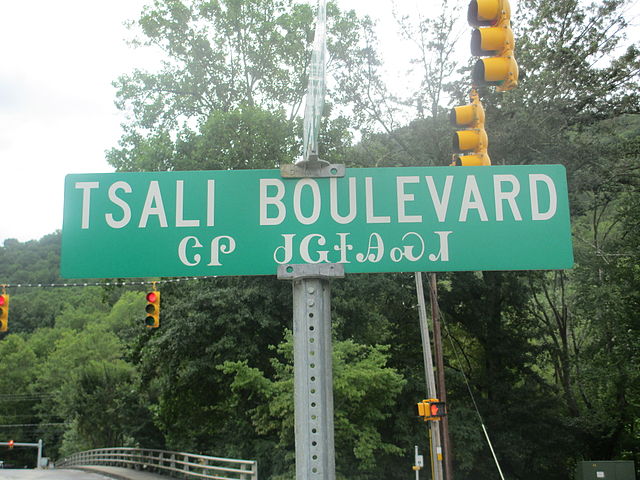Eastern Band of Cherokee Indians
The Eastern Band of Cherokee Indians (EBCI), is a federally recognized Indian tribe based in western North Carolina in the United States. They are descended from the small group of 800–1,000 Cherokees who remained in the Eastern United States after the U.S. military, under the Indian Removal Act, moved the other 15,000 Cherokees to west of the Mississippi River in the late 1830s, to Indian Territory. Those Cherokees remaining in the east were to give up tribal Cherokee citizenship and to assimilate. They became U.S. citizens.
Joel Queen, award-winning Eastern Band sculptor and ceramic artist
Blowgun demonstration in Oconaluftee Indian Village, Cherokee, North Carolina
Cherokee or Tsalagi is an endangered-to-moribund Iroquoian language and the native language of the Cherokee people. Ethnologue states that there were 1,520 Cherokee speakers out of 376,000 Cherokees in 2018, while a tally by the three Cherokee tribes in 2019 recorded about 2,100 speakers. The number of speakers is in decline. The Tahlequah Daily Press reported in 2019 that most speakers are elderly, about eight fluent speakers die each month, and that only 5 people under the age of 50 are fluent. The dialect of Cherokee in Oklahoma is "definitely endangered", and the one in North Carolina is "severely endangered" according to UNESCO. The Lower dialect, formerly spoken on the South Carolina–Georgia border, has been extinct since about 1900. The dire situation regarding the future of the two remaining dialects prompted the Tri-Council of Cherokee tribes to declare a state of emergency in June 2019, with a call to enhance revitalization efforts.
Bible cover in Cherokee script
Translation of Genesis into the Cherokee language, 1856
A sign in Tahlequah, Oklahoma in English and Cherokee (transcription: ᏓᎵᏊ ᎪᏪᎵ ᏧᏂᏍᏚᎢᏍᏗ – "daliquu goweli tsunisduisdi")
Tsali Boulevard (transcription: ᏣᎵ ᏧᏩᏐᎯᏍᏗ – "tsali tsuwasohisdi") in Cherokee, North Carolina






